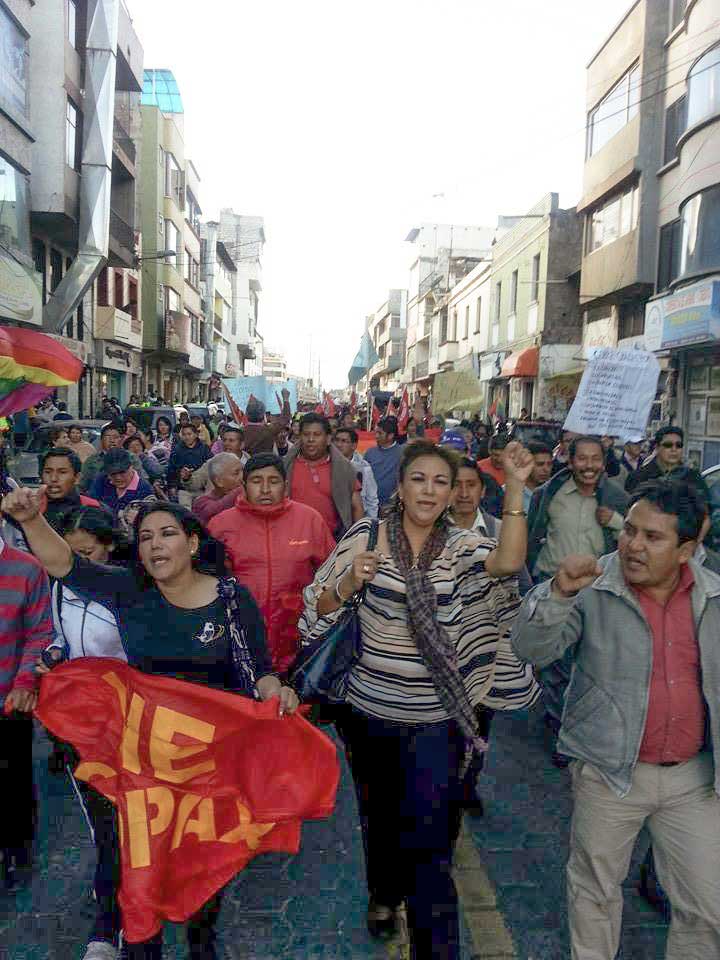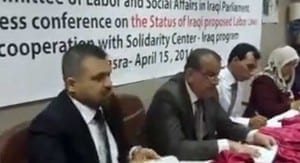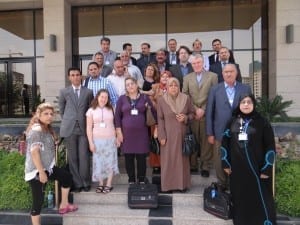
Sep 23, 2014
More than 20,000 trade union members and other Ecuadorans protested regressive government reforms in Quito, the capital, last week, with simultaneous marches in seven other cities.
Those taking part in the rallies oppose proposed constitutional amendments, such as one which would deny new civil service employees rights under the country’s Labor Code, and they object to efforts to pass a proposed Labor Relations Law (Ley Orgánica de Relaciones Laborales) before details of the law are made public.
They also oppose the president’s Executive Decree 16, passed in June 2013, which subjects all nongovernmental organizations to increased oversight and gives the executive branch broad powers to dissolve organizations that it says threaten public peace or interfere with public policy.
Spearheaded by Ecuador’s union movement, including the United Workers Front (Frente Unitario de Trabajadores, FUT) and the Inter-Union Committee (Comité Intersindical ), the march drew support from a broad civil society coalition that included indigenous people’s organizations, teachers, students, medical professionals, retirees and unemployed workers. In a statement calling for the national march, FUT noted that despite the country’s economic gains, largely from lucrative oil exports, and increased government investment in public infrastructure, citizen’s livelihoods have not improved and fundamental rights continue to be constrained.
The proposed Labor Relations Law has not been open to civil society input since it was announced by the Ministry of Labor in May 2013. It is expected to move to the legislature in November.
Declaring the popular protests an attempt to destabilize the country, President Rafael Correa ordered massive deployment of authorities to stop the marches. According to two student organizations, the Federation of Secondary Students (La Federación de Estudiantes Secundarios del Ecuador, FESE) and the Federation of University Students (Federación De Estudiantes Universitarios Del Ecuador, FEUE), at least 100 students were detained by police.
The Inter-Union Committee is comprised of four national unions (sugar, water, municipal and provincial government workers unions); two provincial federations (Esmeraldas and Pastaza); and 50 workplace level unions.
Inter-Union Committee affiliates participating in marches included sugar workers in Milagros; provincial government employees, municipal employees and hospital, water and sanitation workers in Cuenca; water and sanitation workers in Santa Isabel; sugar workers, municipal workers and rural workers in Loja; water and sanitation workers in Manta; provincial government workers in Guayas; and municipal workers in Esmeraldes.
Provincial government unions active in the Inter-Union Committee also sent delegations of workers to participate in the marches in Quito, including workers from Azuay, Guayas, Morona, Pastaza and Imbabura.
Apr 21, 2014

Labor Committee Vice President Salih Al Asady (second from left) speaks at a press conference held by Iraqi unions
Iraqi trade union leaders and members are keeping the spotlight on Parliament, urging lawmakers to pass a trade union law that has been pending since January.
Some 82 unions members and leaders from all Iraqi trade unions, with support from the Solidarity Center, held a press conference in Basra April 15, their latest effort to secure passage of the law. If passed, it would provide first-ever worker rights protections in line with core labor standards, including freedom of association.
In a demonstration of solidarity, the Kurdistan United Workers Union (KUWU) sent two delegates to the event, which also included the head of Parliament’s labor committee.
Union representatives also raised concerns over the scope of the law, which does not cover public-sector workers. Labor Committee Vice President Salih Al Asady, who took part in the event, said he would bring the issue to Parliament. He also urged the Iraqi union leaders and members to continue to show their strength through rallies and other campaign actions to push lawmakers to vote on the law before this session ends. Elections are scheduled April 30, and the current Parliament will remain in session until June 15.
Parliament has voted on 46 of 157 articles, however the remainder have been unable to be voted on due to an insufficient number of members of Parliament showing up to each session, though the law continues to appear each day on the agenda. This is the result of political conflicts, in particular around the inability of the parliament to pass the budget law.
Six major Iraqi labor unions, together with the Solidarity Center, have worked since June 2012 to bring proposed changes to the nation’s draft labor law in line with International Labor Organization (ILO) conventions. Workers are still subject to labor laws from the Saddam Hussein era.
Watch a video of the event (in Arabic).
Jan 22, 2014

Iraqi union leaders and Solidarity Center staff last May. Credit: Solidarity Center
Update: The draft version of Iraq’s new labor law emerged from Parliament in recent days but falls far short of protecting workers freedom to collectively bargain, according to Iraqi union leaders.
On Friday, Iraqi union leaders expressed their concerns to members of Parliament at a Solidarity Center-sponsored conference, and union leaders have written a letter to the Speaker of Parliament in which they detail the proposed law’s shortcomings. Read the letter in English and Arabic. The AFL-CIO also has written to the Speaker of Parliament expressing “deep disappointment” that the proposed legislation “contains several provisions that violate international standards.” Read the AFL-CIO letter.
January 10, 2014—The Iraqi Parliament is currently debating legislation that for the first time could contain worker rights protections in line with core labor standards, including freedom of association. The law would replace the 1987 labor law passed by Saddam Hussein’s regime.
The vote comes nearly a decade after the Inetrnational Labor Organization (ILO) first worked with the government of Iraq to draft new legislation. The ILO commented on drafts in 2007 and 2012, finding them severely inadequate in regards to protecting the rights of workers, in particular freedom of association.
Six major Iraqi labor unions, together with the Solidarity Center, have worked since June 2012 to bring proposed changes to the nation’s draft labor law in line with International Labor Organization (ILO) conventions. In addition, the Solidarity Center facilitated meetings among the unions and the labor committee in parliament, the Iraqi Ministry of Labor and Social Affairs, and the International Trade Union Confederation (ITUC) and the ILO, which provided recommendations based on ILO conventions. The labor federations launched a public advocacy campaign for passage of the labor law, and have received strong support from the global labor movement, including global union federations, the AFL-CIO and the British Trade Union Congress (TUC).
On a parallel front, a new union law that would replace the 1987 Trade Union Law had its first reading in Parliament this week. The 1987 Trade Union Law bans public-sector unions, which include the majority of Iraqi workers, restricts union pluralism and allows government interference in internal union affairs.
The Solidarity Center has worked closely with the Iraqi labor movement to secure passage of the new trade union law that protects freedom of association for all workers. Parliament plans to hold its second reading before the end of January, after which Iraqi unions will advocate for Parliament to vote on it before the current session ends in April.



